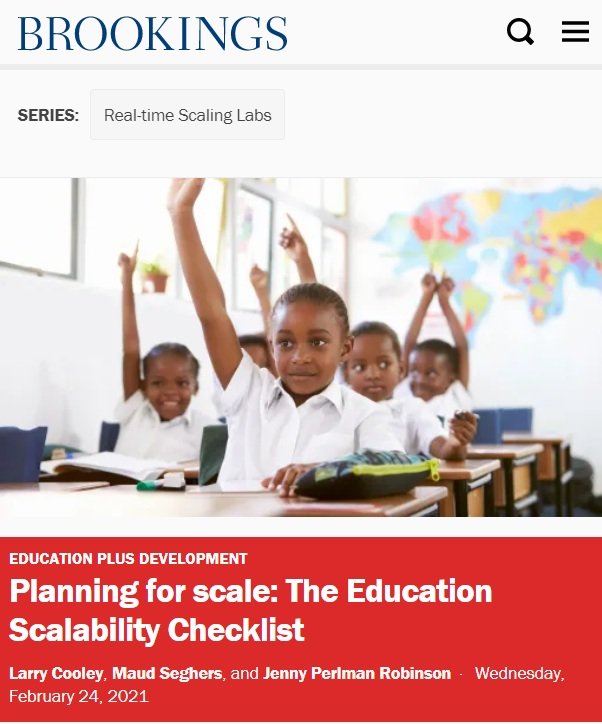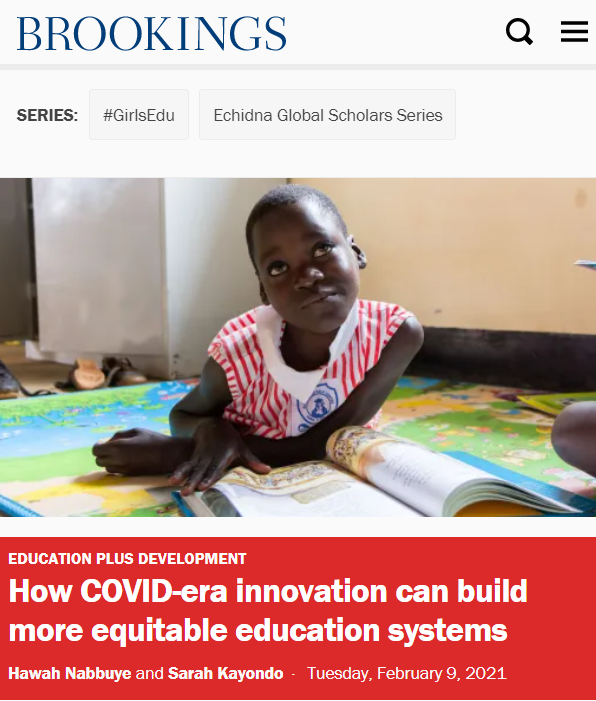
Resource Library
World Bank - Building Better Formal TVET Systems: Principles and Practice in Low- and Middle-Income Countries
Educate! was cited in a joint report by the World Bank, ILO, and UNESCO, which references Educate!’s model and highlights how a focus on foundational skills for self-employment can inform the field of Technical and Vocational Education and Training (TVET).
The World Bank's S4YE - Using Digital Tools for Monitoring and Evaluation of Youth Employment Programs
As one of the World Bank’s S4YE Impact Portfolio partners, Educate! details our approach to program monitoring and data collection.
USAID - Promoting Practices in Engaging Youth and Higher Education Institutions in the COVID-19 Response
Educate!’s distance learning model was highlighted in a case study published by USAID in partnership with the University of Auckland. The study details what tools, guidance, and evidence the education sector used to support learners during the COVID-19 pandemic.
GPE - A lesson from Rwanda: The comprehensive assessment management software that scores highly with teachers
This article spotlights the Comprehensive Assessment Management Information System (CA-MIS), a software application that enables teachers in Rwanda to track students’ progress and grades continuously, encouraging them to engage in critical thinking and become problem solvers.
J-PAL — Investing in Girls' Education? Top 3 Lessons from the Evidence
J-PAL Africa highlights Educate! in its argument for investments in evidence-based interventions on the Global Partnership for Education (GPE) blog. The policy researchers highlight Educate!’s impact as an example of an approach demonstrating strong results for girls.
USAID — Soft Skills and Youth Workforce Development in Sub-Saharan Africa
This brief examines the linkages between soft skills training and youth workforce development outcomes and features Educate! as one of the few organizations breaking ground in this important area of study.
GPE — An Evidence-based Approach for Integrating Skills into Education Systems
After learning that our in-school model measurably impacts youth beyond the classroom, we wondered if governments could adopt and deliver it. In this article, Educate’s leaders position secondary school as the most natural and cost-efficient space for youth to build the skills they’ll need to succeed.
The World Bank — Hard Skills or Soft Skills for the Youth?
Markus Goldstein, Gender Innovation Lab lead at the World Bank, shares the results of the 3-week bootcamp we helped run in 2013, which became the foundation of our out-of-school youth model. Goldstein concludes, “Overall, this is a cool result – and one of the stronger I have seen for youth-oriented training.”
AEA — Overcoming Underrepresentation of Women in Remote Data Collection
Educate! Evaluation Associate Jess Littman’s article highlights what our organization has learned over the past year in our efforts to better capture the perspectives of women and girls in our evaluations.
Brookings — Planning for scale: The Education Scalability Checklist
Educate! partnered with VVOB, Brookings, MSI, Pratham, and STiR to Develop an Education Scalability Checklist — a diagnostic tool to help determine the ease of scaling education initiatives.
Brookings — How COVID-era Innovation can Build More Equitable Education Systems
This piece authored by Educate! leaders details our approach to program development during COVID-19 and the lessons we learned that may increase the equity of education systems in the longer term.
U.C. Berkeley's CEGA — Teaching “Soft Skills” in Uganda
Educate!’s 4-year follow-up RCT of our model in Uganda was featured by Berkeley’s Center for Effective Global Action (CEGA), which provided funding to test Educate!’s impact on fertility and sexual-related behaviors.
The World Bank's S4YE — How Technology Can Help Incorporate Youth Voice In Employment Programs
This World Bank Solutions for Youth Unemployment (S4YE) publication about centering youth voices in youth employment programs features Educate! as a case study.
The World Bank's S4YE — How are Youth Employment programs adapting to COVID‒19?
In this brief, the World Bank highlights different ways in which youth employment projects in S4YE’s Impact Portfolio, including Educate!, adapted their strategies and delivery models in response to COVID‒19.
SSIR — A Better Education for All During—and After—the COVID-19 Pandemic
This publication explores how young learners might be best supported while schools are closed. The piece draws on evidence that Educate! has collected through the evaluation of our distance learning model.
IPA — Rwanda RCT Study Summary
Innovations for Poverty Action (IPA)’s summary of the 4-year follow-on RCT results with researchers from the University of California-Berkeley, The World Bank, and IPA.
Educate! — Rwanda RCT Interpretation Memo
Educate!’s overview of the external RCT from researchers at Oregon State University, the World Bank, and Innovations for Poverty Action (IPA) and partners at the Rwanda Education Board (REB) and Akazi Kanoze Access to study the impact of the Educate! Exchange.
Chioda & Gertler — Executive Summary: Educate! Experience Program Evaluation: Four-Year Follow-Up
Laura Chioda and Paul Gertler's summary of the 4-year follow-on randomized controlled trial (RCT) of our model in Uganda, the Educate! Experience.
Brookings — Lessons Learned From Navigating the Digital Divide During COVID-19
Educate! shares our perspective on how COVID-19 exacerbated inequality in education as well as emerging best practices to combat it.
Mastercard Foundation — Secondary Education in Africa
Mastercard Foundation’s 2020 report names Educate! as one of two innovative organizations leveraging government partnerships to strengthen workforce readiness and entrepreneurial skills among youth.




















